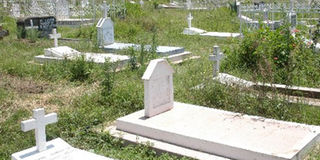If Nakuru sneezed, Kenya would catch a cold

The Nakuru Cemetery, which is nearly full. Nakuru County has a little known distinction … as the final resting place of British and Commonwealth soldiers who gave their lives in the first and second world wars. Photo/FILE
Twenty-one years on, Mr Wilson Leitich does not regret having told Kanu youth wingers of the then all powerful single party in Nakuru to chop off one of the two fingers used as a salute by the multi-party crusaders.
And Mr Koigi wa Wamwere, now 61 and one of the most ardent anti-establishment critics of the time, remembers Nakuru as a citadel of power. “When leaders from Nakuru coughed, all of Kenya caught a cold,” he recalled.
Power, money, political intrigues and big time farming have been the hallmark of Nakuru since its founding by white farmers on the eve of the 20th century.
In Nakuru, individuals in successive regimes have come and gone leaving memories of power… some of which have turned into comedy.
Goat auctioneer
Mr Ezekiel Barngetuny, who became the official goat auctioneer for former President Daniel arap Moi every Christmas Eve in Baringo recalled how he relished power in Nakuru.
“When driving from Nairobi and you reached Stem Hotel, unanusa (you smell) the power from afar before you get to State House where Mzee would be waiting for you,” he said.
Mr Leitich, 74, and Mr Barngetuny, aged 90, both saw and exercised power from Nakuru. The town is in the centre of Kenya, in the middle of the Great Rift Valley and an agricultural hub.
Said Mr Leitich: “I do not regret having told my youths to cut off one finger and leave the legitimate one finger Kanu salute. Time has proved me right that multi-party was no good as it has plunged us into mayhem.”
From colonial white settlers to founding President Jomo Kenyatta and his successor President Moi, Nakuru has been the White House of Kenya.
Rivalry and intrigue between communities have been part of the game since colonial days. The white settlers from Britain contested power with the Boers from South Africa.
Kenyatta and Moi established power barons among the Kikuyu and then the Kalenjin.
Said Wamwere: “Kibaki does not have to be here today as he is the beneficiary of the fiefdoms created by his predecessors where the two communities rivalled and checked each other.”
Nakuru State House once the focus for delegations to the two previous regimes, is no longer the power base that it was because President Kibaki hardly uses it.
Mr Kibaki is averse to receiving delegations and also is a Head of State who keeps his private home private.
Kenyans hardly know the name of his rural home — Kinyange, in Nyeri — unlike President Kenyatta who saw Gatundu become a household name, as did Kabarak for Mr Moi.
“Nakuru is the place where power rivalry has reduced it to a Kosovo, where communities know their corner almost to the exclusion of their rivals,” Mr Wamwere observed.
Oddly, people who once bestrode Nakuru like a colossus often had little or no education. From colonial settlers to post independence Kenya — low-level education, low-level civil servants and low-level party chiefs.
Early settlers included James McQueen, a blacksmith from Scotland and John Boyes, known as the King of the Kikuyu, whose father was a shoemaker from England.
And Hugh Cholmondeley, the third Baron Delamare, a hunter in Somaliland, only settled there after failing to settle down in his Cheshire estate in England.
It was Nakuru that became the epicentre of rivalry between racist Boers and the British settlers like Sir Michael Blundell.
The then Governor, Sir Percy Girouard, remarked that these men were, “of unusual education and social standing.”
But from their outposts in Nakuru and Naivasha, they terrorised every governor who came to Kenya, forcing them to succumb to all their requests, even against instructions from London.
Kihika Kimani
Come Independence, came Mr Kihika Kimani, an illiterate old man from Laikipia who became a power unto himself.
From Nakuru as organising secretary of Gema — the Gikuyu, Embu, Meru Association — he issued edicts and plotted unsuccessfully to ensure a Kikuyu succeeded President Kenyatta, only to fall from grace when power passed to President Moi.
Mr Isaiah Mathenge, a provincial commissioner in Nakuru, was of humble education but reigned as though a governor.
He even threatened to cane politicians like Mr Martin Shikuku, the former Butere MP, who were critical of the Kenyatta government.
Mr Kim Gatende, another Nyeri works officer, made his power felt through road constructions, some of which were Tarmacked in the books but with no bitumen actually on the ground.
Enter Mr Moi and his team. Mr Kariuki Chotara, another illiterate old man, this time from Naivasha, held so much power he could even expel from Kanu politicians like Mr Njenga Mungai of Molo on such a flimsy reason that he had refused a goat from him.
The women’s leader Ms Rahab Wanjiru, nicknamed Mama Steel, was equally a power unto herself.
Then, civil servants like Mr Hezekiah Oyugi, a provincial commissioner, was so powerful that his juniors answered the telephone at the other end while standing to attention and saluting at every instruction.
And that was the point at which overwhelming power turned to comedy … unless of course you were on the receiving end.




